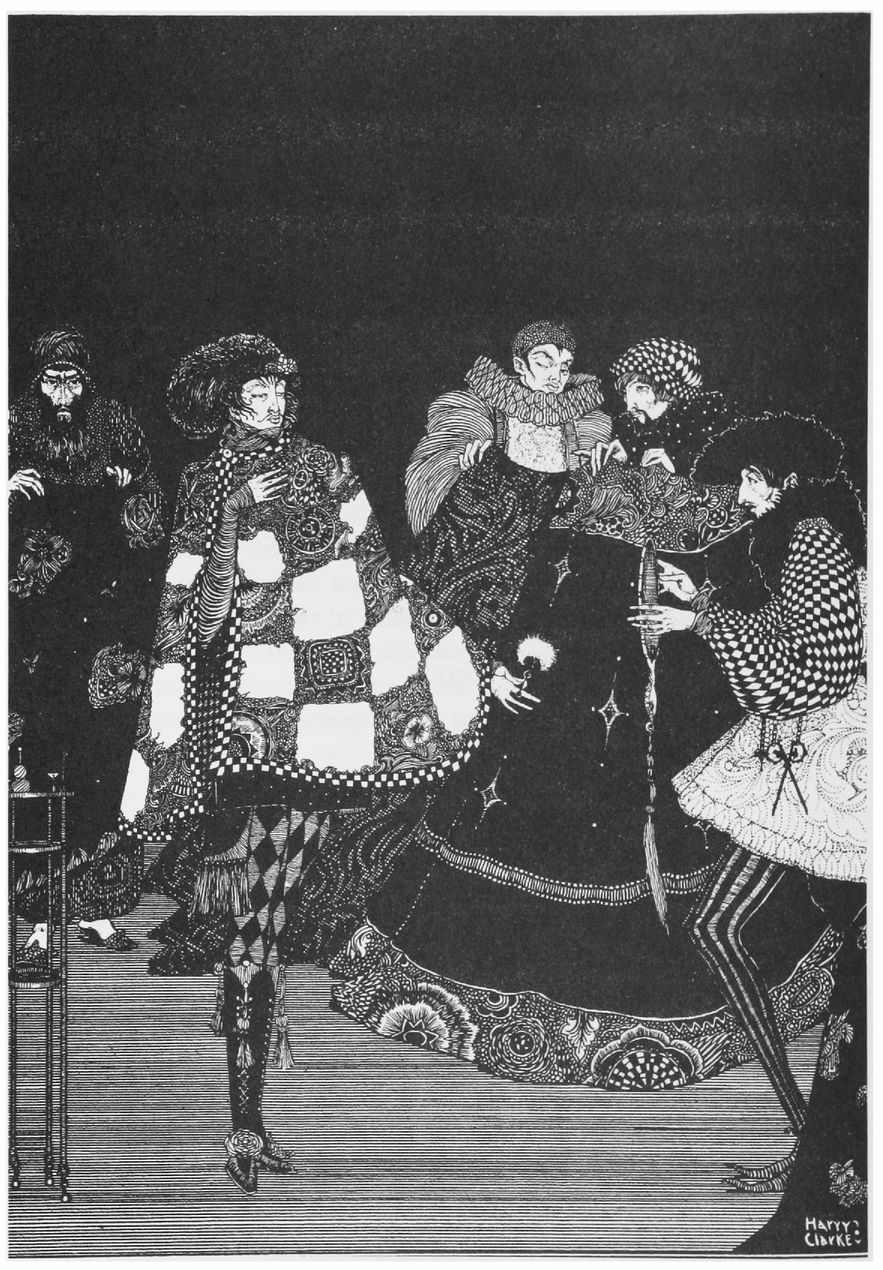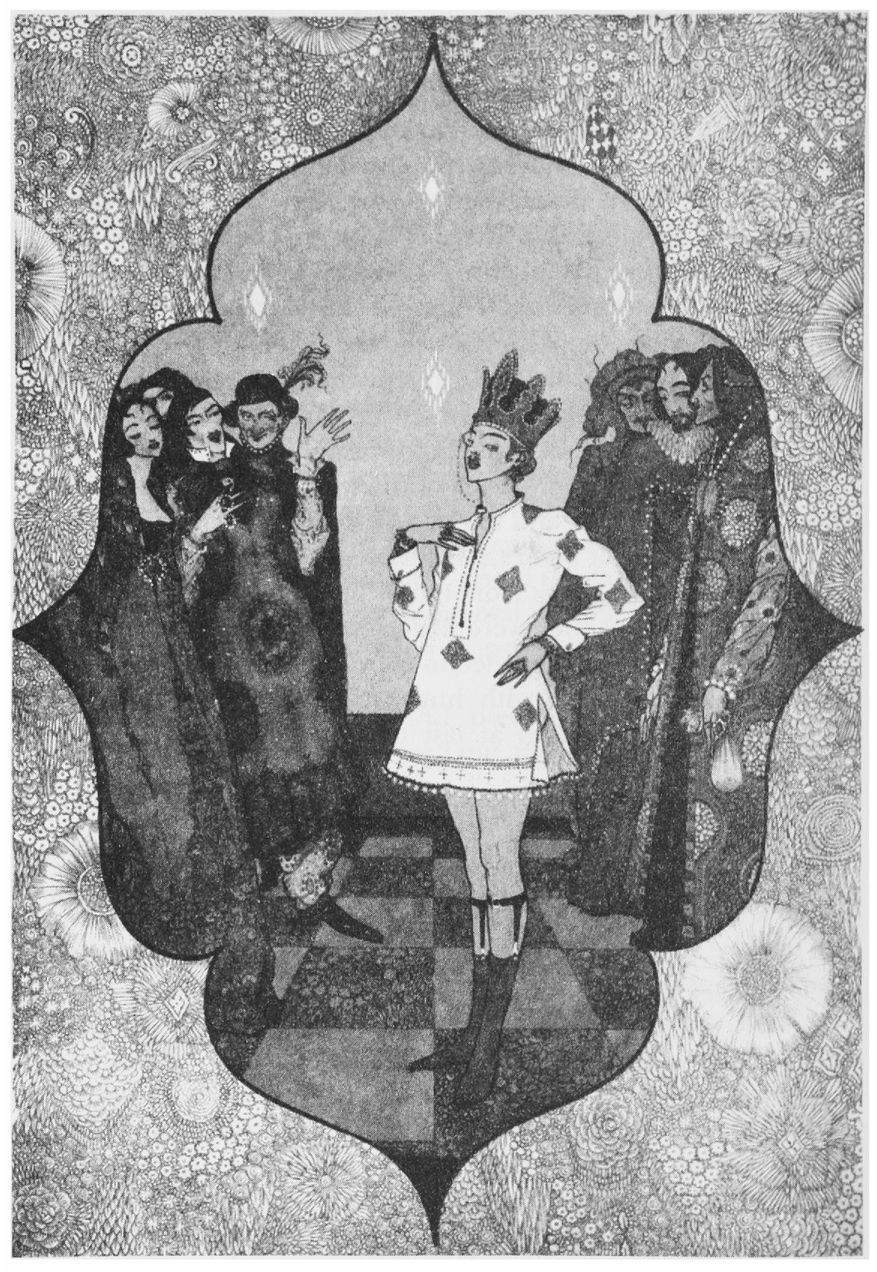THE EMPEROR’S NEW CLOTHES
MANY YEARS AGO THERE lived an emperor who was so tremendously fond of stylish new clothes that he used all his money for dressing himself. He didn’t care about his soldiers, didn’t care about the theater, or driving in the park, except to show off his new clothes. He had an outfit for each hour of the day, and as they say about a king that he’s “in council,” here they always said, “The emperor’s in the dressing room!”
There were lots of amusements going on in the big city where he lived. Many strangers came every day, and one day two swindlers arrived. They said they were weavers, and that they could weave the most beautiful material one could imagine. Not only were the colors and patterns unusually lovely, but the clothes sewn from the fabric had a remarkable characteristic: they were invisible to any person who was incompetent in his job, or who was simply grossly stupid.
“The emperor’s in the dressing room!”
“Those would be some wonderful clothes,” the emperor thought, “by wearing them I could find out which men in my kingdom aren’t fit for their jobs, and I’d be able to tell the wise from the stupid! That fabric must be woven into some clothing for me at once!” and he gave the two swindlers a big deposit so that they could start their work.
They set up two looms and pretended to work, but they had absolutely nothing on the loom. Right away they demanded the finest silk and the most splendid gold. And they put these things into their bags, and worked on the empty looms long into the night.
“I would really like to know how far they’ve come with the material,” thought the emperor, but he was a little uneasy with the thought that those who were dumb, or not at all fit for their jobs, couldn’t see it. Of course, he knew very well that he didn’t have to worry about himself, but he decided to send someone else first to see how it was going. All the people in town knew about the power of the fabric, and everyone was eager to see how incompetent or stupid his neighbor was.
“I’ll send my honest old envoy over to the weavers,” the emperor thought, “He can best determine how the fabric is turning out because he’s smart, and no one is better suited to his job than he is.”
So the dependable old envoy went to the hall where the two swindlers were working on the empty looms. “Good God!” thought the old envoy as his eyes flew wide open, “I can’t see anything!” But he didn’t say that.
Both swindlers asked him to come closer and asked him if it wasn’t a beautiful pattern and lovely colors. They pointed at the empty loom, and the poor old envoy continued to stare, but he couldn’t see anything because nothing was there. “Dear God!” he thought. “Could it be that I’m stupid? I never thought that, and no one must find out! Is it possible I’m not fit for my job? It’s just totally impossible to admit that I can’t see the fabric!”
“Well now, you’re not saying anything about it,” said one who was pretending to weave.
“Oh, it’s beautiful! Absolutely too awesome for words!” the old envoy said and peered through his glasses. “What a pattern and what colors! Yes, I’ll tell the emperor that I like it very much!”
“We’re pleased to hear that,” both weavers said, and then they pointed out the strange pattern and colors by name. The old envoy paid close attention so he could repeat the information when he came back to the emperor, and that’s what he did.
Then the swindlers demanded more money and more silk and gold, needed for the weaving. They put it all in their own pockets, and not a shred appeared on the loom, but they continued as before to weave on the empty loom.
Soon the emperor sent another competent official to see how the weaving was progressing, and if the fabric would soon be finished. The same thing happened to him: he peered and stared, but since there wasn’t anything on the empty loom, he couldn’t see a thing.
“Well, isn’t this a beautiful piece of material?” both swindlers asked him, and pointed out and explained the lovely pattern, which wasn’t there.
“I’m not stupid!” the man thought. “So then I’m not fit for my excellent job? That’s odd enough, but no one must find out about it.” So he praised the fabric he didn’t see and assured them that he was delighted with the beautiful colors and the lovely pattern. “It’s just marvelous,” he told the emperor.
Everyone in town was talking about the beautiful fabric.
So then the emperor wanted to see the fabric while it was still on the loom. With a large group of selected advisers, among them the two who had already been there, he went off to see the clever crooks, who were weaving with every fiber of their being, but without a thread on the loom.
“Isn’t it magnifique?” asked both of the wise, old officials. “Look at the pattern, your majesty, and the colors!” and they pointed at the empty loom, because they thought the others could see the fabric.
“What!” thought the emperor. “I don’t see a thing! This is dreadful! Am I stupid? Am I not fit to be emperor? This is the most terrible thing that could happen to me!”
“Oh, it’s just splendid!” said the emperor. “It has my highest approval,” and he nodded contentedly as he observed the empty loom for he didn’t want to say that he couldn’t see anything. The whole group that accompanied him looked and looked but didn’t get anything more out of it than any of the others. So they echoed the emperor, “Oh, it’s very lovely,” and they advised the emperor to wear the splendid new clothes from the fabric for the first time at the big parade that was soon to occur. “It’s magnificent! Delightful! Excellent!” was on everyone’s lips, and they were all thoroughly pleased with the fabric. The emperor gave each of the swindlers a knight’s cross to hang on his chest, and the title of Knight of the Loom.
The entire night before the parade the swindlers sat illuminated by a flood of light from more than sixteen candles. People could see that they were busy getting the emperor’s new clothes ready. They pretended to take the fabric from the loom and cut into thin air with huge scissors. They sewed with thread-less needles, and at last they said, “There, now the clothes are finished!”
The emperor came to them with his most distinguished cavaliers. Both swindlers lifted one arm in the air as if they were holding something and said, “See, here are the pants. Here’s the jacket, and here’s the cape!” They continued on and on. “They are as light as cobwebs. You might think you weren’t wearing anything, but that’s the beauty of this fabric.”
“Yes!” said all the cavaliers, but they couldn’t see a thing, for there wasn’t anything to see.
“Now, if your royal majesty would be so kind as to remove your clothes,” said the swindlers, “we’ll put the new ones on, right here in front of this big mirror.”
The emperor laid aside his clothes, and the swindlers acted as if they gave him each piece of the new outfit they had sewed, and the emperor turned and twisted in front of the mirror.
“Lord, how good that looks on you! How beautifully it fits!” they all said. “What a pattern! What lovely colors! What a precious outfit it is!”
“Lord, how good that looks on you! How beautifully it fits!”
“They’re waiting outside with the canopy that will be carried over the throne in the parade,” said the Master of Ceremonies.
“Well, I’m ready,” said the emperor. “Doesn’t it fit beautifully?” and he pirouetted in front of the mirror one more time. He was pretending to admire his splendid outfit.
The chamberlains who were to carry the train of the cape, fumbled around on the floor, as if they were lifting up the train. They walked carrying their arms in the air and didn’t dare act as if they saw nothing.
So the emperor paraded under the lovely canopy, and all the people on the streets and in the windows said, “Good God, how awesome the emperor’s new clothes are! What a splendid train he has on his cape! How beautifully it fits!” None of the people would admit that they didn’t see anything because then they wouldn’t be fit for their jobs, or they’d be called terribly stupid. None of the emperor’s clothes had been so admired before.
“But he isn’t wearing anything at all,” said a little child.
“Dear God, listen to the voice of innocence,” his father said, and each person whispered to the other what the child had said.
“But he isn’t wearing anything at all!” everyone shouted at last.
The emperor shuddered because he was afraid they were right, but he thought, “I have to finish the parade.” And the chamberlains walked on, carrying the train that wasn’t there.


